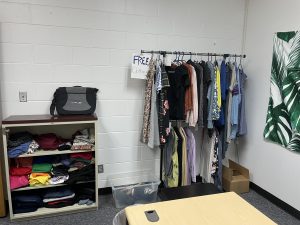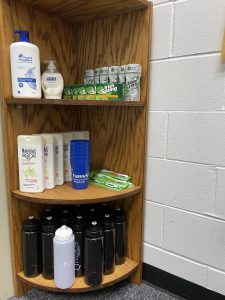Hi Folks! I’m Emily, the school based resource navigator. I work with the Cedar County Public Health Department & North Cedar School District to help connect youth and families with various academic, medical, dental, social/emotional and other support service needs. Providing support, information, assistance identifying options and potential solutions, empowering students and families to set goals and make choices that are right for them.
Things I can help with as a resource navigator:
- linking students and/or family members to health services, such as medical or dental clinics, mental/behavioral health services, or other services designed to meet specific social/emotional, academic or health needs.
- Assistance arranging appointments and transportation for a student and/or family members to medical, dental and mental health appointments.
- Connect youth to community-based programs such as in-home family support programs, group support, public health programs, housing, household resources, employment, etc.
- Refer students/families to community resources including but not limited to: Food, housing, rental assistance, utility assistance, heat, electricity, clothing, school supplies
North Cedar “Resource Closet”
“Providing Free Clothing and Personal Hygiene Products to All North Cedar Students and Families”
Overview of Need:
The North Cedar Community School District serves about 800 students in the rural communities of Clarence, Lowden, Mechanicsville, and Stanwood in east-central Iowa.
In 2019, around 42% of the North Cedar School District student population qualified for free or reduced lunch. This means that around 42% of North Cedar families were at or below the federal income eligibility guidelines.
Economic Factors remain one of the top factors influencing high school graduation in the USA.
“The strongest predictors that a student is likely to drop out are family characteristics such as: socioeconomic status, family structure, family stress (death, divorce, family moves), and the mother’s age. Low socioeconomic status has been shown to bear the strongest relationship to students’ tendency to drop out” (Ritter, 2015). Data shows that in the US “In 2009, the event dropout rate of students living in low-income families was about five times greater than the rate of their peers from high income families (7.4 percent vs. 1.4 percent)” (Chapman et al., 2011). In 2016 the event dropout rate of students living in low-income families was around 3 times greater than the rate of their peers from middle- and high-income families. (Cui et al., 2018).
It is clear that economic factors have a correlation to high school dropout rates. With many of our North Cedar families facing financial strain, it is important to provide supports to help alleviate stressors and risk factors leading to dropouts.
The Goal of the “Resource Closet” is to: Uplift and empower our North Cedar students and families through minimizing financial barriers to basic necessities, so students can focus on their education. Thereby reducing the barriers that cause or contribute to students struggling to attend and/or graduate school. To ultimately improve the lives of our students, families and overall community.
Why? Lack of personal hygiene and cleanliness is a risk factor that can impede students’ abilities to successfully graduate. Acquiring personal hygiene products and clothing can be a huge challenge for many families, (yes, even families with full time jobs). These items are expensive and buying them can shift money away from other important purchases like; food, transportation, rent, utilities, healthcare, etc. Students who don’t have access to hygiene products can feel socially isolated and are at greater risk of being bullied. Additionally, lack of access to clean clothes or basic hygiene items can negatively affect student’s abilities to learn and succeed in school. (Davidson, 2012)
How it works: The “Resource Closet” is a private and safe environment. “Resource Closet” is located in Resource Navigator’s office, in the same hallway as the high school art room (there is a sign on the door). Student use of the closet is kept confidential. Jr/Sr high students can stop by the “Resource Closet” Monday, Wednesdays and Fridays between 7:30am – 3:30pm. Lowden and Mechanicsville Elementary Families: Please contact Emily Smith, the Resource Navigator, to coordinate a pickup location that works best for you!
Additionally, students and families can request a private appointment during (or outside) the listed hours by contacting Emily Smith, the School Resource Navigator.
Get on the “Text List” or “Email List” to be notified when new items arrive in closet: Contact Emily Smith, School Resource Navigator


Current Items Available: Clothing, Basic Hygiene Items (body wash, soap, toothbrushes, deodorant)
Currently Taking Donations of: Hygiene products: Body wash, bar soap, face wash, shampoo, conditioner, deodorant, toothbrushes, toothpaste, lotion, face lotion, period care products, toilet paper, washcloths, sponges for dishwashing, dishwashing soap, hand soap, hairbrushes and combs, laundry detergent.
Other items: nail polish, body spray / perfume, face masks, book, journals, blankets, stuffed animal, coloring books, tote bags, duffle bags, backpacks, coloring supplies
Freshly washed and gently used: Children’s clothing (youth and infant), boys and men’s clothing, girls and women’s clothing, shoes, athletic shoes and cleats, new socks (various sizes), new underwear (various sizes), coats (all sizes), snow/winter items (all sizes)
Items needed for the “Resource Closet” itself: Displays: (shelving/bookshelf, shoe display, storage bins, coat hangers)
Notes: There can be a lot of shame and stigma surrounding receiving help. Especially for something as sensitive as personal hygiene and cleanliness. If you are feeling anxiety or stress surrounding the idea of physically coming into the “Resource Closet”, please reach out to the Resource Navigator to discuss an alternative that works for you.
- As the weather gets colder, folks often have a difficult time getting hot water. This is nothing to be ashamed about! If you don’t have the ability to shower or bathe at home, please reach the Resource Navigator.
- Also available in office and upon request: Applications for SNAP, Applications for Community Action Eastern Iowa Utility Bill assistance/Weatherization
References:
Chapman, C., Laird, J., Ifill, N., and KewalRamani, A. (2011). Trends in high school dropout and completion rates in the United States: 1972-2009, (NCES 2012-006). U.S. Department of Education, National Center for Education Statistics.
Cui, J., Holmes., McFarland, J., and Rathbun, A. (2018). Trends in high school dropout and completion rates in the United States: 2018 Compendium Report (NCES) U.S. Department of Education, National Center for Education Statistics.
Davidson, Jennifer (2012, December 17) Poor Hygiene in Schools: How It’s Affecting Education, and How It’s Addressed in our Community. KSMU. https://www.ksmu.org/2012-12-17/poor-hygiene-in-schools-how-its-affecting-education-and-how-its-addressed-in-our-community
Ritter, Barbara (2015) Factors Influencing High School Graduation Issue. Brief Prepared for the Washington Student Achievement Council.
Contact Information
Emily Smith, B.S. (she/her/hers)
School Based Resource Navigator
Cedar County Public Health & North Cedar School District
Work Cell (Call/Text): 563·886·4711
[email protected]
Community Action Eastern Iowa
Eastern Iowa Mental Health And Disability Services Region
LMC Resources Directory
Social-Emotional and Behavioral Health Resources
· Info about Local Mental Health Services
· Resources for clothing, food, housing, childcare, transportation etc.
· Info about LGBTQ+ community, gender dysphoria, resources and allyship
· Info and hotlines for domestic violence, sexual violence and relationships
· Info about human trafficking, and hotlines
· List of resources to find support groups/ learn more about Grief/ Grieving
· Resources/ info about substance use/abuse
· Virtual Calming Room (learn self-soothing techniques and coping skills through several videos and websites)
What is a Crisis? A crisis is any stress or pressure that has become too great for you to cope with alone.
Crisis Services are:
- available throughout the entire Eastern Iowa MHDS Region (Cedar, Clinton, Jackson, Muscatine, and Scott Counties)
- at no cost to residents of the Eastern Iowa Region (they are funded at least in part by the Region)
- participation is voluntary
24-Hour Crisis Line – 1-844-430-0375 – answered 24 hours a day, every day of the year by Foundation 2. The crisis line is answered by trained, compassionate telephone counselors. Available to all ages.
24-Hour Mobile Crisis Outreach – 1-844-430-0375 – available 24 hours a day, every day of the year by Foundation 2. Trained counselors meet with the individual experiencing the crisis in a safe place, in the individual’s home or a safe place in the community. Please see the Mobile Crisis Services page for more information. Available to all ages.
Mental Health Crisis Information & Resources